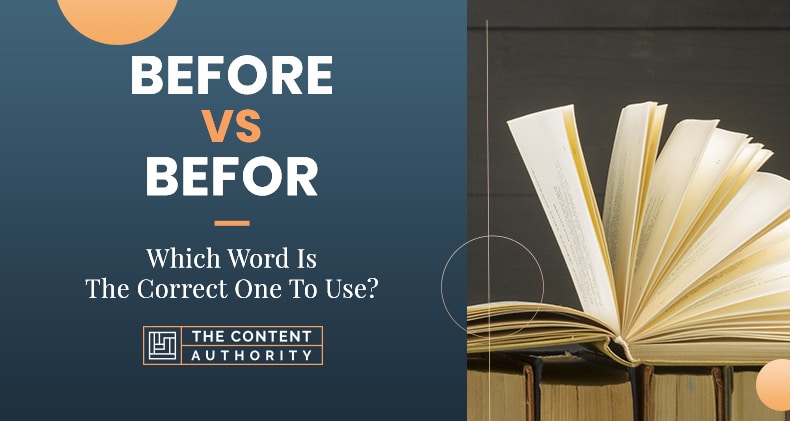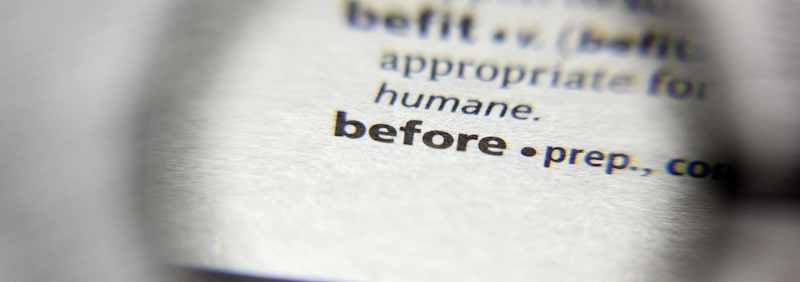We are all familiar with the word ”before”. We have used it many times during our lifespans, and we will continue to do so until we cannot utter any more words. Now, have you heard the phrase ”befor” before?
”Before” is the correct and only appropriate spelling for the preposition we are accustomed to using. ”Befor” has no current meaning after becoming obsolete, and it is now the commonly misspelled version of the same preposition. It does carry the same phoneme, which could be why some people are still confused about it.
When Does This Word Originate?
The origin of the phrase ”before” goes back to the year 1000 A.D from the Proto-Germanic words by and fora that mean ”from the front” or ”in the front of” and it was adopted by Old English into ”beforan” to convey the same meaning both as an adverb and a preposition. Other dead tongues such as Old Saxon, Old High German, Old Frisian had similar etymologies for the word such as ”biforan”, ”bifora”, and ”bifara”, respectively. Additionally, in German, which is very much an alive language, the word ”bevor” carries the same meaning.
It did not become a conjunction until the 1200s to mean ”previous to the time when” but it had precursor phrases such as ”fore” and ”afore”, which share the same dialect as adverbs. The preliminary versions were already staples within old sailor’s nautical jargon to describe stations on their ships. For example: ”In the fore part of the ship”. Additionally, Before the mast has long been a term used to describe the everyday life of a seafarer.

How Is ”Before” Conjugated?
When conjugated as an adverb, they modify and restrict the meaning of verbs. A more straightforward way to recall what adverbs do is to keep in mind they exist to answer the questions: where, how, how long, when, how much, or how often?. However, the word can also be used as an adjective, and they limit the meaning of nouns by naming their qualities like angry, unique, or big.
As both an adverb and an adjective, the word has the synonyms already, anteriorly, earlier, beforehand, earlier, preliminarily, formerly, and previously, to name a few. They all mean something that has happened in advance or at an earlier time.
As a preposition, the word ”before” has the function to combine with another noun to form a phrase that expresses predication or modification. Other similar prepositions are above, about, behind, and below. During this function, ”before” includes the synonyms ahead of, fore, ere, prior to, and previous to.
Earlier, we touched base on how fore and afore would be the preceding or archaic dialect for the word before. That was, of course, until fore became obsolete as an adjective and an adverb while afore is still considered appropriate for use as both an adverb and a preposition.
Other Word Usage Posts
What Does ”Befor” Mean?
Similarly, the word ”befor” used to be a preposition to mean something ”in current time” but was cataloged as obsolete since it has the same phoneme as the word ”before” and means the exact opposite. The word itself can be split into ”be” and ”for”, which means that a noun such as a place, person, or a thing exists ”in current time” for a particular purpose.
The verb ”to be” is known to be the most malleable and ever-changing of all the English language verbs, so much that it can seem it has no distinguishable pattern. It is very irregular, especially when we consider how much we rely on it as part of our vernacular. Its conjugations range as ”am”, ”is”, ”are”, ”was”, ”were”, ”being”, and ”been”.
”To be or not to be, that is the question” is a well-known phrase despite most people not knowing exactly where this short excerpt came from. It is Hamlet, by the way, and William Shakespeare wrote it. The verb ”to be” is used chiefly as conjunction with another verb, and it can also act as a link to a different verb and join the subject of the sentence with an adjective complement or subject complement.
When it links to another verb as a complement, it supplies no action to a sentence but either re-identifies it or modifies it as a subject and adjective complement, respectively. For example: ”Our trip to Disney World was fantastic” or ”John Wayne is also known as Duke”.
So, given how slippery this verb can be, you can see how it may have been used differently in its early days in Old English, which was the case with the word ”befor”. It could be applied to a sentence to mean that something belongs or exists for yourself or a particular purpose. For example: ”This ship befor me” translates as this ship is for me, this ship exists in this specific time to be mine.
You may have noticed that we’ve used yet another nautical example, and that is because we can’t help but hear it come out of a pirate’s mouth when we hear this word enunciated this way. ”Aye, matey. The rum, it befor me!” sounds like a perfect sentence to move forward with how the term was used. And, I, for one, can’t help to imagine Geoffrey Rush’s character from Pirates of the Caribbean saying it in the characteristically poor language that sea pirates employ.
In some sense, it acted as a portmanteau word, or a blend, if you will—the result of combining two or more words to express the merger of the meaning of its parts. Excellent examples of this are chortle (snort and chuckle), brunch (lunch and breakfast), and old reliable spork (spoon and fork).
Why Is ”Befor” Obsolete Now?
So, you can see how a sentence like ”This will be for me” could’ve been written as ”This will befor me” in Old English. But, as we know, over time, new words are created and cataloged as obsolete to keep our language concise and to minimize words that sound overtly similar. This is especially important in cases like ”before” and ”befor” because they say and spell nearly identical but carry quite the opposite meanings altogether.
While now it is considered a misspelled version of ”before”, we know that ”befor” actually had a meaning and the lazy function to act as the merging representation of the verb ”to be” and the preposition ”for”. It was used to connote something that belonged to a person, place, or thing.
Conclusion
It is hard to argue that the idea behind removing this word from our dictionary was not a good idea. We need the word ”before” more often, and, as slippery as the verb ”to be” is, we can very well use it without combining it in this outdated manner.
You can use this word now, but we run a very high risk of sounding like a groggy freebooter. Keep in mind that if you were to use it now, you would also have to sacrifice other words to sound historically accurate. If you don’t believe us, we dare ye to walk the plank, matey!
Shawn Manaher is the founder and CEO of The Content Authority. He’s one part content manager, one part writing ninja organizer, and two parts leader of top content creators. You don’t even want to know what he calls pancakes.


